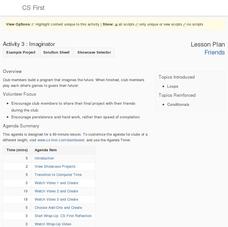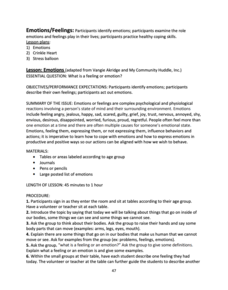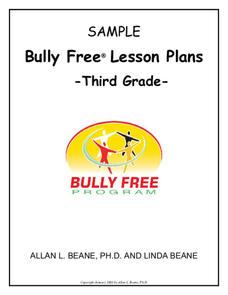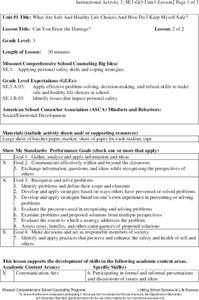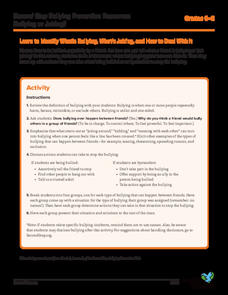Google
Friends: Imaginator
What does a future as a computer scientist look like? Pupils learn about loops in computer coding by writing a story about the future. They include the repeat until and wait blocks in the Scratch program to incorporate these loops.
US Institute of Peace
What Does Conflict Mean?
Is conflict always bad? Learners begin a unit on conflict resolution with an exercise that defines conflict, reviews common words associated with conflict, and encourages partners to brainstorm conflicts that may have positive results.
San Diego County District Attorney
Emotions/Feelings
Three lessons delve deep into the topic of feelings and the importance of expressing one's emotions. Through grand conversation, hands-on learning experiences, and reflective writing, scholars interpret the ups and downs of everyday...
Good Project by Harvard Project Zero
The Good Project Lesson Plans
Excellence, ethics, and engagement are the three E's featured in a unit that promotes good work among elementary scholars. Through discussion, reflection, read-alouds, activity worksheets, and written responses, participants gain...
Bully Free Systems
Bully Free Lesson Plans—Kindergarten
Keep bullying away with the help of two lessons that focus on the golden rule and reporting hurtful behavior. Both lessons incorporate a classroom meeting that encourages an open dialogue about making good choices at school. Finger...
Bully Free Systems
Bully Free Lesson Plans—Second Grade
Two lessons shed light on bullying in hopes to create a bully-free zone in your classroom. The first lesson defines bullying and allows scholars to reflect on their behavior. The second lesson focuses on choices and consequences. Both...
Bully Free Systems
Bully Free Lesson Plans—Third Grade
Two lessons shed light on two types of bullying: verbal and cyberbullying. After defining the two types, scholars take part in whole-group discussions, complete worksheets, and write reflections. A parent or guardian chat encourages an...
Bully Free Systems
Bully Free Lesson Plans—Fourth Grade
Two lessons detail what do if you are or see someone being bullied. The Four-Step STOP method features an assertive way to make school a bully-free zone. Tips offer advice to be a helpful bystander. A parent or guardian chat bridges the...
Bully Free Systems
Bully Free Lesson Plans—Fifth Grade
Two lessons take a look at bullying. Lesson one focuses on physical bullying. Scholars identify the bullying type's qualities, read short stories and answer comprehension questions. Lesson two offers advise on what to do as a bystander...
Bully Free Systems
Bully Free Lesson Plans—Sixth Grade
Two lessons stress the importance of keeping your classroom bully-free. Discussion, collaborative work, role-play, and writing allows participants to examine whether their classroom is welcoming to new members and decide what they should...
DirectTV
Staying Safe on The Internet
Watson the Walrus takes scholars through an interactive workbook all about internet safety. Safety tips, a maze, crossword puzzle, quiz, and coloring page make up six pages that encourage smart choices while surfing the web.
Ashoka
A Toolkit for Promoting Empathy in Schools
Instill kindness with a unit all about empathy. Lessons and activities follow a prepare, engage, reflect, and action sequence. Learning experiences include making the classroom a safe environment, peer-invented handshakes, discussions...
Equality and Human Rights Commission
Learning area 1: Who am I?
Five activities encourage scholars to dream big and celebrate the similarities and differences of those around them. Learners take part in two active practices that showcase how their peers are the same and different. Worksheets...
Missouri Department of Elementary
Ingredients of a Relationship Recipe
An eye-catching hook makes a smart analogy between ingredients for a food recipe and ingredients for quality relationships. Scholars discuss and list qualities they feel contribute to positive interactions. Pupils create a recipe card...
Missouri Department of Elementary
My Problem…Your Problem…Our Problem
Encourage sixth graders to take responsibility for their actions and become a problem solver. Pupils discuss new problems faced in sixth grade then identify ones that involve other people. A worksheet guides their practice in conflict...
Missouri Department of Elementary
Be a Problem Solving Star
Encourage scholars to problem solve everyday frustrations using the STAR method. Using the acronym, learners remember to stop, think, act, and review. Participants begin with a math analogy in which they problem-solve to find the correct...
Missouri Department of Elementary
Same and Different
A take on "If You're Happy and You Know It" opens a lesson plan about similarities and differences. Scholars speak in-depth on the unique characteristics that make up their classroom. The teacher or counselor records responses. Class...
Missouri Department of Elementary
Conflict Mediation – Part 2: Practice
A lesson challenges scholars to prove their understanding of conflict mediation. Small groups role-play scenarios using two mediators and two disputants. Peers observe then discuss their findings. A worksheet outlines groups'...
Missouri Department of Elementary
Conflict Mediation – Part 1: Getting Ready
Two scholars walk into a room arguing, what is happening? Peers observe the two actors in preparation for a whole-class discussion about conflict. Learners establish a conflict, name the three approaches—passive, aggressive, and...
Committee for Children
Students Learn to Stop Rumors Before They Start
Two activities look at how rumors are spread and ways class members can stop them. The first activity brings forth an in-depth conversation about how reporters gather information to write articles and how students can implement the same...
Committee for Children
Create a Positive Classroom Climate and Help Stop Bullying
Encourage kindness and respect with an activity that challenges scholars to create a poster that details three ways to exhibit the desired character traits.
Missouri Department of Elementary
Can You Erase the Damage?
A pencil and an eraser bring forth the message that negative comments never truly disappear. On a large piece of paper, scholars list negative comments then attempt to replace them with kind ones. Pupils discuss the impact of negative...
Missouri Department of Elementary
Don’t Tease Me!
A whole-class discussion sheds light on school bullying and ways to prevent it. Scholars share a moment when they observed or experienced some sort of teasing. Pupils brainstorm ways such behavior can be stopped or prevented.
Committee for Children
Learn to Identify What’s Bullying, What’s Joking, and How to Deal With It
A quick lesson takes a look at the differences between bullying and joking. Through whole-class discussion, scholars identify between the two behaviors and brainstorm actions to take to cease bullying behavior. Small groups share with...
Other popular searches
- Friendship 7
- Art and Music Friendship
- Friendship Activity
- Friendship Letters
- Friendship Poems
- Friendship Skills
- Qualities of Friendship
- Friendship Acrostic Poems
- Friendship Lessons
- Friendship Art
- Friendship Quilt
- Friendship Graffiti Wall


